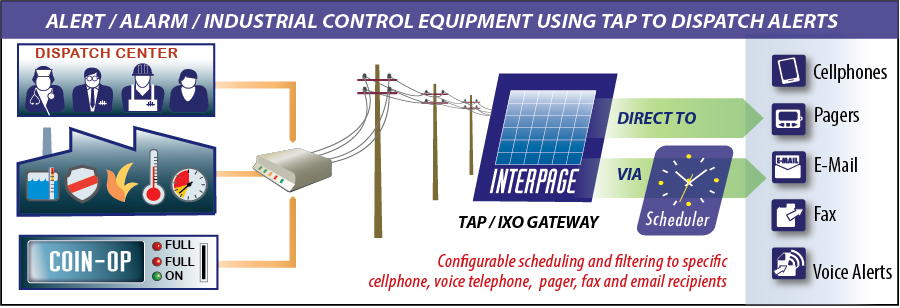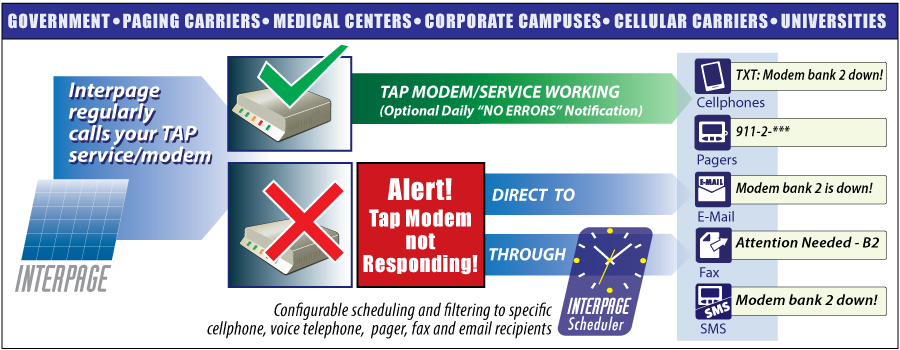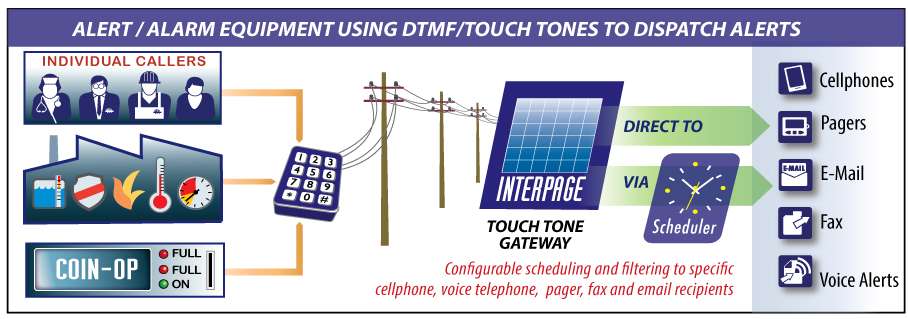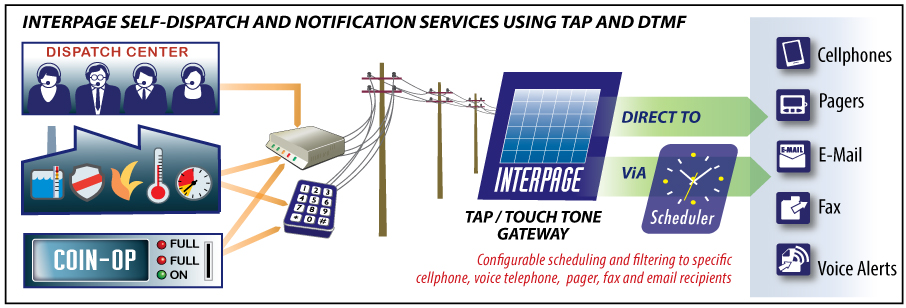This page details "self-dispatch"/TAP (alpha) and DTMF/Touch Tone (numeric) access for messaging and notification integration with smart/cell phones, SMS/MMS/Internet-capable devices, pagers, faxes, e-mail addresses, and Voice/Text-to-Speech notification services offered by Interpage.
An integrated package of TAP (modem) dispatch and Touch Tone access with multiple PINs, pager IDs, local TAP and DTMF access numbers, online-scheduling/filtering, and more is available through the Alarm/Equipment Monitoring/Messaging service.
The Self-Dispatch services are of particular use when a given office, site, or building's internet connection is down or otherwise fails, and allows servers, equipment, and/or alarm systems an alternate path utilizing regular phone lines to send out status messages, emergency alerts, and other messages to first responders, on-call staff, or other personnel immediately, bypassing the internet, to allow for a rapid response. For companies and entities which use a Voice-over-IP phone system, the Self-Dispatch services may be used to notify repair staff via a non-VoIP phone line that an outage has occurred and requires attention to restore telephone service to offices or buildings with VoIP telephone service.
Interpage's Self-Dispatch services integrate with a wide variety of alert and monitoring equipment/systems, building automation systems, and industrial control equipment from many vendors, including Johnson Controls/Metasys, Trane Building Controls, York Heating and Air-Conditioning Systems, and many others, to provide a robust and redundant notification regime to alert from one to hundreds of recipients of status changes, alarm conditions, alerts, and other situations requiring monitoring or immediate attention.
Verizon Wireless, AT&T Wireless, T-Mobile, Rogers/Cantel, and other cellular customers who utilized their respective carrier's (now discontinued) TAP (modem) dispatch service may continue to do so with Interpage as a replacement TAP/self-dispatch provider via either the "TAP/self-dispatch" service plan (detailed below) or the Alarm/Equipment TAP/DTMF Access service based on the features and access methods required. Questions regarding how either above dispatch services can replace the discontinued Verizon Wireless, T-Mobile, AT&T Wireless TAP service(s) (or for TAP access to other carriers in the US, Canada, or worldwide) may be directed to +1 (510) 315-2750 or use the Interpage Online Inquiry page to submit questions about your firm's specific application.
[ Back to Main
| Flat Version
| Messaging/Paging Main
| Overview
| TAP/IXO Self-Dispatch
| Touch Tone/DTMF Numeric Dispatch
| WebAlert
| TAPTest TAP Monitoring
| Signup Form
| Contacts ]
Overview of Interpage Self-Dispatch Services
Self-Dispatch services provide a critical link for offices, servers and server co-locators, buildings, and factories with automated status or alarm equipment with a non-internet based means to alert on-call staff in the event of an internet connectivity failure. Interpage's self-dispatch services do not rely on an Internet connection and thus provide a vital link in situations where an internet connection has failed (or is simply not available) for alerting on-call staff and emergency-response employees on their cellphones, pagers, email, fax, and voice telephones (via OutVoice).
Messages dispatched to Interpage via TAP/IXO or Touch Tone/DTMF can be distributed by the Interpage Scheduler (for a demo, log in as guest and leave the password blank), which allows customers to have their TAP and/or Touch Tone messages sent to a variety of end devices, such as pagers, cellphones, fax, Text to Speech, and/or email addresses. The Scheduler and Filtration interface uses simple HTML formatting, no scripting, and no special plug-ins or downloads are needed, and can be accessed from older browsers and (non-"smart") mobile phones as well as from all modern browsers and internet devices.
Both the modem-based TAP and the Touch Tone-based numeric/DTMF services can be used as replacements for recent shutdowns of cellular based TAP/modem access from Verizon Wireless, AT&T Wireless, et. al., as well as the removal of the "numeric paging" services from Sprint/Nextel, Verizon, and others, allowing customers to keep their current wireless provider and continue to utilize their wireless phones and devices as if the given carrier had maintained TAP and/or Touch Tone/paging access.
Interpage TAP/IXO and Numeric/DTMF ("Touch Tone") Self-Dispatch Services allow for the integration between legacy, non-internet connected services with internet-based applications, services, and devices. Self-Dispatch services provide non-"Internet"/non-TCP/IP based connectivity to Interpage's paging, e-mail, fax and/or Voice/Text-to-Speech gateway services. Such access is typically useful for redundant emergency notification, legacy equipment which use Touch Tone or modem notification, operator dispatch services, remote monitoring equipment, and any other automated service which messages via TAP or Touch Tone/DTMF.
TAP/IXO Port Access
Additionally, large customers of Cellular or Paging Carriers, those who dispatch to hospitals with private/in-house paging systems, or any group/entity which sends TAP messages to one or more carriers/recipients, may utilize the TAPTest service to ensure that their carrier, paging service, or messaging recipient is operational and able to accept messages. The TAPTest service may also be used to log TAP outages, thus serving as an independent auditor of a given carrier's TAP-based modems and dispatch to provide documentation needed for SLA and other credits related to outages and other events when a given TAP service is not working.
The TapTest page provides more detailed information and pricing on the TapTest service to ensure your TAP/IXO messaging platform is operational at all times!
WebAlert also makes it easy to add alternate "on-call" personnel or responders via a unified web-based interface instead of processing manual changes at each office or piece of equipment which sends out alert messages.
The WebAlert page provides more detailed information and pricing for the WebAlert service.
Contacts
To receive additional information about Interpage's Paging and Dispatch Services, please contact us via:
•Web-based Support/Inquiry Interface
•Telephone: +1 (650) 331-3900
•Interpage Contacts Page
We will be happy to answer any questions you may have concerning Interpage's TAP/IXO, Touch Tone integration, Paging, or other services!

TAP/IXO Gateway: Interpage's TAP to SMS & E-Mail Gateway allows automated equipment and self-dispatch systems to send SMS/text-messages, pages, e-mails, fax messages, and/or voice messages to one or more recipients. Emergency response departments, 24 hour "on-call" personnel, and other services which require an alternate to Internet access via dialup may benefit from Interpage's TAP/IXO Gateway to facilitate the dissemination of time-critical messages when Internet connectivity is down or otherwise inoperative. TAP, IXO and other dispatch protocols are supported.
TAP Self-Dispatch recipients may be up to 10 email addresses, Cellphones/SMS, Alpha and Numeric pagers, international mobile phones, and even POTS (voice) telephones and cellphones which lack text-messaging capabilities via the OutVoice text-to-speech notification service. The Interpage TAP/IXO Gateway is configurable from the Web and/or Telnet, and messages may be redirected instantly via any Interpage delivery method. (Additional destinations may be purchased in blocks of 10 and/or via additional PIN/PagerIDs.)
The TAP EMail/SMS modem dispatch service can be used as a more robust alternative to those offered (or which had been offered) by major wireless and paging carriers, delivering messages to cellular phones and pages, and offering filtering and scheduling of received messages and the ability to direct them to multiple destinations (including US/Canadian and International smart/cellphones, Alpha and Numeric-only pagers, fax, email and voice-only telephones), based on time-of-day, day of the week, and/or content.
A demonstration of the Web-based "scheduler" is available here; please log in as guest and leave the password blank. You may also connect via telnet to interpage.net, log in as guest, and select option 6 from the main menu.
Additional information on Interpage's TAP Dispatch and Messaging Gateway is available on the TAP/IXO Gateway page.
TapTest Service

TAPTest TAP/IXO Accessibility Test Service: TAPTest is a specialized self-dispatch service which regularly checks one or more given TAP/IXO access numbers, modems, or entire modem banks, to ensure that they are working properly and operating so as to be able to accept submissions via TAP. Cellular and Paging Carriers, Hospitals, Goverment Agencies, Public Safety, Corporate Campuses, and any operator of TAP-based services may employ TAPTest to ensure that any outages or problems are immediately reported to on-call staff before their customers and/or people who need to send vital messages discover an outage or problem, helping any company's or institution's image of dependable reliability.
Alert Notification with Touch Tone (DTMF) and/or Caller-ID Triggers

A fail-safe or "last-resort" alarm notification service to notifiy via text message, pager, fax and voice is also available. The Alarm Notification Service is a variant of the DirectPage(sm) service, whereby an individual caller, operator, automated voicemail system, or any other device or system which dials out via Touch Tones (DTMF) may dial into Interpage's DirectPage Numeric Interface, enter a unique PIN or be screened by CallerID to identify the desired account, and then a numeric, alpha, or pre-programmed message, which will in turn be delivered to one or more e-mails and/or destination devices (such as cellphones, pagers, fax machines, or using text-to-speech voice synthesis via the OutVoice service).
Additionally, if your alarm service or notification equipment can not send out Touch Tones, the service can notifiy you based only on a call from said equipment, so that a single, short phone call to a dedicated number assigned only to your account will trigger an alert (Caller-ID matching is also available to prevent unwanted alerts from wrong-number callers).
Scheduling "where" and "when" received alerts are broadcast to is entirely controlled by the Scheduler Web-based interface (log in as guest and leave the password field blank) or via telnet access. Customers may "schedule" when received alerts are sent out, to whom, and via what mechaism directly from the schedule page, with any changes taking effect immediately.
Please review the Alarm Messaging & Integration Page for additional details.
WebAlert Service
Integration of Modem, TAP/IXO, Touch-Tone, PIN-based and/or Web Submissions with an Interpage-hosted database of notification destinations. WebAlert integrates a variety of legacy equipment, such as voicemail systems, paging terminals, numeric and alpha paging systems, Operator-Dispatch services and other similar equipment and systems under a single, web-based interface. Incoming dispatches from any of the above sources may be ordered, screened, prioritized and ultimately sent to one or more destinations based on the extant WebAlert settings. By having all messages sent to the Interpage WebAlert service, continued remote/manual adjustments of equipment when a given recipient changes is no longer needed -- all notification equipent can be set to contact the Interpage Web-Alert server via DTMF/Touch Tone, Modem, TAP/IXO, HTTP (Web), and/or SMTP (Email) and incoming connections from remote sites can be processd and altered through the WebAlert interface, eliminating the need to manually change all remote equipment when a given notification regime changes.
Last modified 02/15/2025


